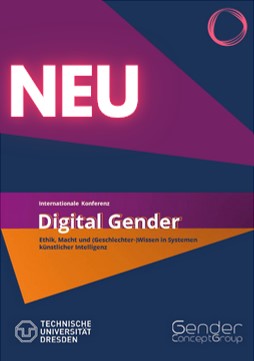Cyborgs, Tryborgs, Techno-Ableism
Perspectives of Feminist Disability Studies on Artificial-Intelligent Health Technologies
DOI:
https://doi.org/10.17169/ogj.2023.212Keywords:
Ableism, Autofiction, Cyborg, Feminist Disability Studies, Artificial Intelligence, TechnologyAbstract
Feminist disability studies has always maintained a tangled relationship with the icon of feminist critique of technology – the cyborg figure. Dimensions such as the questioning of ideologies of bodily naturalness, wholeness and closure have led to intense debate. At the same time, depoliticising metaphors of disability, the negation of the material, economic living conditions of disabled women and especially the idealisation of prostheses in the cyborg myth have always created unease on the part of feminist disability studies. This article takes this ambivalent relationship as a starting point to ask how the cyborg figure could be told differently. On the one hand, the focus will be on semi-fictional everyday knowledge of disabled women, and on the other hand, on the topic of artificially intelligent health technologies.
References
Amoore, Louise (2021): The Deep Border. In: Political Geography. doi: 10.1016/j.polgeo.2021.102547
Auma, Maureen Maisha (2020): Nur tagsüber sind Universitäten weiße Institutionen. https://www.tagesspiegel.de/wissen/struktureller-rassismus-an-deutschen-hochschulen-nur-tagsueber-sind-universitaeten-weisse-institutionen/26730214.html (18.03.2022).
Ballweber, Jana (2021): Wenn Gesundheitsdaten bei US-Konzernen landen. https://netzpolitik.org/2021/unklare-rechtslage-bei-gesundheitsapps-wenn-gesundheitsdaten-bei-us-konzernen-landen/ (15.08.2022).
Bariffi, Jose Francisco (2021): Artificial Intelligence, Human Rights and Disability. In: Pensar. Revista de Ciências Jurídicas 26 (2), 1–14. doi: 10.5020/2317-2150.2021.12704
Böll Stiftung (2018): Künstliche Intelligenz (1/4): Wer denkt da eigentlich? https://www.boell.de/de/media/audio/kuenstliche-intelligenz-14-wer-denkt-da-eigentlich (18.3.2022).
Buolamwini, Joy/Gebru, Timnit (2018): Gender shades: intersectional accuracy disparities in commercial gender classification. In: Proceedings of Machine Learning Research 81, 77–91.
Campbell, Fiona Kumari (2020): The violence of technicism: Ableism as humiliation and degrading treatment. In: Brown, Nicole/Leigh, Jennifer (Hg.): Ableism in Academia Book Subtitle. Theorising experiences of disabilities and chronic illnesses in higher education. London: UCL Press, 202–224. doi: 10.2307/j.ctv13xprjr.18
Cave, Stephen/Dihal, Kanta (2020): The Whiteness of AI. In: Philosophy & Technology 33, 685–703. doi: 10.1007/s13347-020-00415-6
Cheney-Lippold, John (2011): A New Algorithmic Identity: Soft Biopolitics and the Modulation of Control. In: Theory, Culture & Society 28 (6), 164–181. doi: 10.1177/0263276411424420
Cheyne, Ria (2013): "She Was Born A Thing": Disability, the Cyborg and the Posthuman in Anne McCaffrey’s The Ship Who Sang. In: Journal of Modern Literature 36 (3), 138–156. doi: 10.2979/jmodelite.36.3.138
Couldry, Nick/Mejias, Ulises A. (2018): Data Colonialism: Rethinking Big Data’s Relation to the Contemporary Subject. In: Television & New Media 20 (4), 1–14. doi: 10.1177/1527476418796632
Deleuze, Gilles/Guattari, Felix (1992): Tausend Plateaus. Kapitalismus und Schizophrenie. Berlin: Merve Verlag.
Esswein, Ann/Müller, Pascale/Sukharchuck, Daria (2021): Agentur für Ausbeutung. https://www.zeit.de/arbeit/2021-09/pflegekraefte-ukraine-ausbeutung-agentur-vermittlung-pflegenotstand-legalitaet-arbeitsrecht (22.05.2023).
Falkenhayner, Nicole (2020): The Ship Who Sang: Feminism, the Posthuman, and Similarity. In: Open Library of Humanities 6 (2), 1–24. doi: 10.16995/olh.598
Federici, Silvia (2019): Hexenjagd. Die Angst vor der Macht der Frauen. Münster: Unrast.
Fink, Dagmar: Cyborg werden: Möglichkeitshorizonte in feministischen Theorien und Science Fictions (Gender Studies). Bielefeld: transcript Verlag. doi: 10.1515/9783839458556
Forlano, Laura (2017): Data Rituals in Intimate Infrastructures: Crip Time and the Disabled Cyborg Body as an Epistemic Site of Feminist Science. In: Catalyst. Feminism, Theory, Technoscience 3 (2), 1–28. doi: 10.28968/cftt.v3i2.28843
Fuchs, Christian (2013): Theorising and analysing digital labour: From global value chains to modes of production. In: The Political Economy of Communication 1 (2), 3–27. http://www.polecom.org/index.php/polecom/article/view/19
Garcia Doell, David Ernesto/Koslowski, Barbara (2021): Klassismus in der ableistischen Klassengesellschaft. In: Seeck, Francis/Theißl, Brigitte (Hg.): Solidarisch gegen Klassismus. Organisieren, intervenieren, umverteilen. Münster: Unrast, 168–179.
Gerste, Ronald D. (2007): "Fall Ashley": Ein ethisches Dilemma. In: Deutsches Ärzteblatt 104 (3), A–94/B–88/C–84.
Graw, Isabelle/Weingart Brigitte (2019): ENTRE NOUS. Ein Briefwechsel über Autofiktion in der Gegenwartsliteratur zwischen Isabelle Graw und Brigitte Weingart. In: Texte zur Kunst 115, 39–6 5.
Haggerty, Kevin D./Ericson, Richard V. (2000): The Surveillant Assemblage. In: British Journal of Sociology 51 (4), 605–622. doi: 10.1080/00071310020015280
Haraway, Donna (2013): SF: Science Fiction, Speculative Fabulation, String Figures, So Far. In: A Journal of Gender, New Media, and Technology 3. doi: 10.7264/N3KH0K81
Haraway, Donna (2008): When Species Meet. Minneapolis, London: University of Minnesota Press.
Haraway, Donna (1995): Ein Manifest für Cyborgs. Feminismus im Streit mit den Technowissenschaften. In: Haraway, Donna/Hammer, Carmen/Stiess, Immanuel (Hg.): Die Neuerfindung der Natur. Primaten, Cyborgs und Frauen. Frankfurt, New York: Campus, 33–73.
Hübner, Marlies (2018): Verstörungstheorien. Die Memoiren einer Autistin, gefunden in der Badewanne. Berlin: Schwarzkopf & Schwarzkopf.
Hübner, Marlies (2016): Twitter ist für Autisten super. https://kurier.at/leben/marlies-huebner-twitter-ist-fuer-autisten-super/184.893.134 (30.01.2022).
Kafer, Alison (2013): Feminist, Queer, Crip. Bloomington: Indiana University Press. doi: 10.1080/23312521.2019.1673352.
Knecht, Michi (2013): Nach Writing-Culture, mit Actor-Network: Ethnografie und Praxeografie in der Wissenschafts-, Medizin-, und Technikanthropologie. In: Hess, Sabine/Schwertl, Maria/Moser, Johannes (Hg.): Europäisch-ethnologisches Forschen. Neue Methoden und Konzepte. Berlin: Reimer, 79–106.
Kunz, Alexa Maria (2015): Log- und Tagebücher als Erhebungsmethode in ethnographischen Forschungsdesigns. In: Hitzler, Ronald/Gothe, Miriam (Hg.): Ethnographische Erkundungen. Methodische Aspekte explorativ-interpretativer Forschungsprojekte. Wiesbaden: VS, 141–162. doi: 10.1007/978-3-658-07257-5_10
Lupton, Debora (2014): Self-tracking Cultures: Towards a Sociology of Personal Informatics. In: Association for Computing Machinery (Hg.): Proceedings of the 26th Australian Computer-Human Interaction Conference on Designing Futures: the Future of Design, 77–86. doi: 10.1145/2686612.2686623
McCaffrey, Anne (1969): The ship who sang. New York: Ballantine.
McNeil, Maureen (2007): Feminist Cultural Studies of Science and Technology Studies. New York: Routledge. doi: 10.4324/9780203938324
Medica.de (2020): Bionische Prothese: einfach anlegen, intuitiv bedienen. https://www.medica.de/de/physio-tech/Bionische_Prothese_einfach_anlegen,_intuitiv_bedienen (15.08.2022).
Microsoft News Center: KI & Inklusion: Technologien mit und für Menschen mit Behinderung entwickeln. https://news.microsoft.com/de-de/features/ki-inklusion-technologien-mit-und-fuer-menschen-mit-behinderung-entwickeln/ (15.08.2022).
Nahman, Michal (2018): Migrant extractability: Centring the voices of egg providers in cross-border reproduction. In: Reproductive BioMedicine and Society Online 7, 82–90. doi: 10.1016/j.rbms.2018.10.020
Netzforma e.V. (2020): Wenn KI dann feministisch. Impulse aus Wissenschaft und Aktivismus. https://netzforma.org/publikation-wenn-ki-dann-feministisch-impulse-aus-wissenschaft-und-aktivismus (15.08.2022).
Ng, Isla (2017): How It Feels to Be Wired. On the Digital Cyborg Politics of Mental Disability. In: Atlantis 38 (2), 160–170.
Reeve, Donna (2012): Cyborgs and Cripples: What Can Haraway Offer Disability Studies? In: Goodley, Dan/Hughes, Bill/Davis, Lennard (Hg.): Disability and Social Theory: New Developments and Directions. New York: Palgrave Macmillan, 91–111. doi: 10.1057/9781137023001_6
Rehberg, Peter (2019): Queere Autofiktion als Körperprotokoll. In: Texte zur Kunst 115, 103–117. https://www.textezurkunst.de/de/115/queere-autofiktion-als-korperprotokoll/ (15.08.2022).
Roy, Rituparna/Uekusa, Shinya (2020): Collaborative autoethnography: „self-reflection” as a timely alternative research approach during the global pandemic. In: Qualitative Research Journal 20 (4), 383–392. doi: 10.1108/QRJ-06-2020-0054
Shew, Ashley (2021): Technoableism, and Future AI. International Disability Rights Affirmation Conference 2021 (Transkript). https://www.virtualability.org/wp-content/uploads/2021/12/IDRAC-2021-Transcript-Shew.pdf (20.3.2022)
Siebers, Tobin (2008): Disability Theory. Michigan: University of Michigan Press. doi: 10.3998/mpub.309723
Siebers, Tobin (2001): Disability in Theory: From Social Constructionism to the New Social Realism of the Body. In: American Literary History 13 (4), 737–754. doi: 10.1093/alh/13.4.737
Smith, Peter/Smith/Laura (2021): Artificial intelligence and disability: too much promise, yet too little substance? In: AI and Ethics 1, 81–86. doi: 10.1007/s43681-020-00004-5
Solden, Sari (2012): Women with Attention Deficit Disorder: Embrace your Differences and Transform Your Life. Ann Arbor, MI: Introspect Press.
Sturm, Andreas (2017): The Experience of Pain, Disability Identity and the Disability Rights Movement. In: Waldschmidt, Anne/Berressem, Hanjo/Ingwersen, Moritz (Hg.): Culture–Theory–Disability: Encounters Between Disability Studies and Cultural Studies. Bielefeld: transcript, 122–130.
Waldschmidt, Anne (2017): Disability goes cultural. The Cultural Model of Disability as an Analytical Tool. In: Waldschmidt, Anne/Berressem, Hanjo/Ingwersen, Moritz (Hg.): Culture–Theory–Disability: Encounters Between Disability Studies and Cultural Studies. Bielefeld: transcript, 19–29. doi: 10.14361/9783839425336-003
Walgenbach, Katharina: Gender als interdependente Kategorie. In: Walgenbach, Katharina/Dietze, Gabriele/Hornscheidt, Lann/Palm, Kerstin (Hg.): Gender als interdependente Kategorie. Neue Perspektiven auf Intersektionalität, Diversität und Heterogenität. Opladen: Barbara Budrich, 23–65. doi: 10.2307/j.ctvddzkrr.4
Weise, Jillian (2018): Common Cyborg. https://granta.com/common-cyborg/ (10.11.2021).
Whittaker, Meredith et. al (2019): Disability, Bias, and AI. https://ainowinstitute.org/wp-content/uploads/2023/04/disabilitybiasai-2019.pdf.
Zeit Online (2018): Uber-Auto fuhr mit deaktivierter Notbremse. https://www.zeit.de/mobilitaet/2018-05/selbstfahrende-autos-uber-unfall-software (15.08.2022).

Downloads
Published
How to Cite
Issue
Section
Categories
License
All contributions in Open Gender Journal are published under the Creative Commons Attribution 4.0 International license. You may freely make use of the corresponding texts in accordance to the conditions of the license (License contract, generally understandable version). There is no exclusive transfer of usage rights ("copyright transfer"). Open Gender Journal does not charge authors any costs for publication (so-called Article Processing Charges, APC) or submission (so-called Submission Charges). Authors are encouraged to share their contributions in other places, such as repositories.












